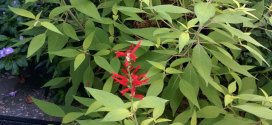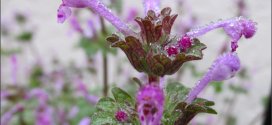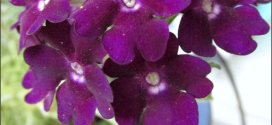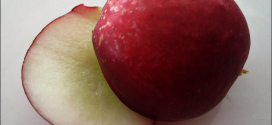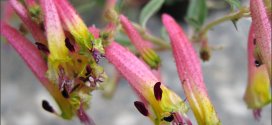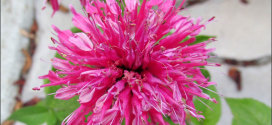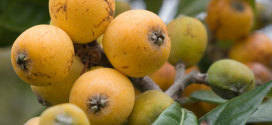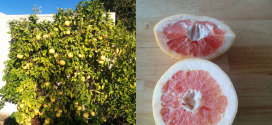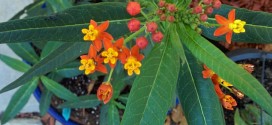Salvia elegans. This plant is attractive to bees, butterflies and/or birds. Tubular red flowers and lime-green leaves are fragrant with a scent similar to pineapple. Can be grown in a 1-foot deep, 1-foot wide pot. Salvia elegans, commonly called Pineapple sage or Tangerine Sage, is a perennial shrub native to Mexico and Guatemala. It inhabits Madrean and Mesoamerican pine-oak forests …
Read More »Tag Archives: bee
Henbit
Henbit is a small but pretty winter wildflower. Hummingbirds enjoy this wild edible for the nectar. Henbit is also an important early season source of nectar and pollen for honeybees. Unlike many of its relatives in the mint family, henbit does not have a strong or distinctive mint scent. The common name, Henbit, comes from the observation that chickens like …
Read More »Verbena
Rose Verbena, Purple Verbena, Homestead Verbena, Glandularia canadensis Family: Verbenaceae (ver-be-NAY-see-ee) (Info) Genus: Glandularia (glan-doo-LAIR-ee-uh) (Info) Species: canadensis (ka-na-DEN-sis) (Info) Cultivar: ? Synonym:Glandularia drummondii Synonym:Glandularia lambertii Synonym:Verbena canadensis Synonym:Verbena lambertii Synonym:Verbena x ? Category: Perennials Height: 6-12 in. (15-30 cm) Spacing: 6-9 in. (15-22 cm) 18-24 in. (45-60 cm) 24-36 in. (60-90 cm) 36-48 in. (90-120 cm) …
Read More »Nectarine – Artic Jay
The Artic Jay Nectarine is a delicious white nectarine. When growing in a small space or a container, it is best to have a dwarf or ultra-dwarf rootstock. If you go with standard or semi-dwarf rootstock, the tree will suffer because its roots cannot spread enough. The biggest problem with nectarines is the dreaded “Peach Leaf Curl”. This plant is attractive to …
Read More »Cuphea cynea
Black eyed Cuphea, Tri-coloured Cuphea, Cuphea cyanea. Cuphea is attractive to bees and hummingbirds. Family: Lythraceae (ly-THRAY-see-ee) (Info) Genus: Cuphea (KYOO-fee-uh) (Info) Species: cyanea (sy-AN-ee-uh) (Info) Category: Shrubs, Tropicals and Tender Perennials Height: 24-36 in. (60-90 cm) Spacing: 36-48 in. (90-120 cm) Hardiness: USDA Zone 9a: to -6.6 °C (20 °F) USDA Zone 9b: to …
Read More »Bee Balm
Try growing bee balm in view of a window so you won’t miss the acrobatics of hummingbirds that visit in summer. Bee balm also attracts butterflies and bees.
Read More »Loquat
Our backyard neighbor had a mature loquat tree. It was about 12 feet tall and 9 feet wide. During the spring thousands of blossoms would flower. Hundreds of bees would swarm. My poor cherry tree flowered at the same time and scarcely a bee would move the 3 feet from the loquat tree to the cherry tree. The loquat fruits …
Read More »Grapefruit – Oro Blanco
Grapefruit (Citrus x paradisi ‘Oro Blanco’). Productive. Hardy. Long-lived (my tree is over 40 years old). Can be grown in container or small ground area (mine is in a 24-inch trench). Family: Rutaceae (roo-TAY-see-ee) (Info) Genus: Citrus (SIT-rus) (Info) Species: x paradisi (par-ih-DEE-see) (Info) Cultivar: Oro Blanco Category: Edible Fruits and Nuts, Trees, Tropicals and Tender Perennials …
Read More »Basil – Sweet
Basil, Sweet Basil Recipe for Basil Pesto
Read More »Blood Flower – Aclepias curassavica
Blood flowers (Aclepias curassavica) are red-orange with yellow hoods. Flowering continues throughout the summer to early autumn. Hummingbirds, butterflies and bees are attracted to the flowers. Monarch butterflies lay eggs on this plant and the resulting larvae (caterpillars) use the plant leaves as a food source. Flowers are followed by long, narrow seed pods (3-4” long) which split open when …
Read More »